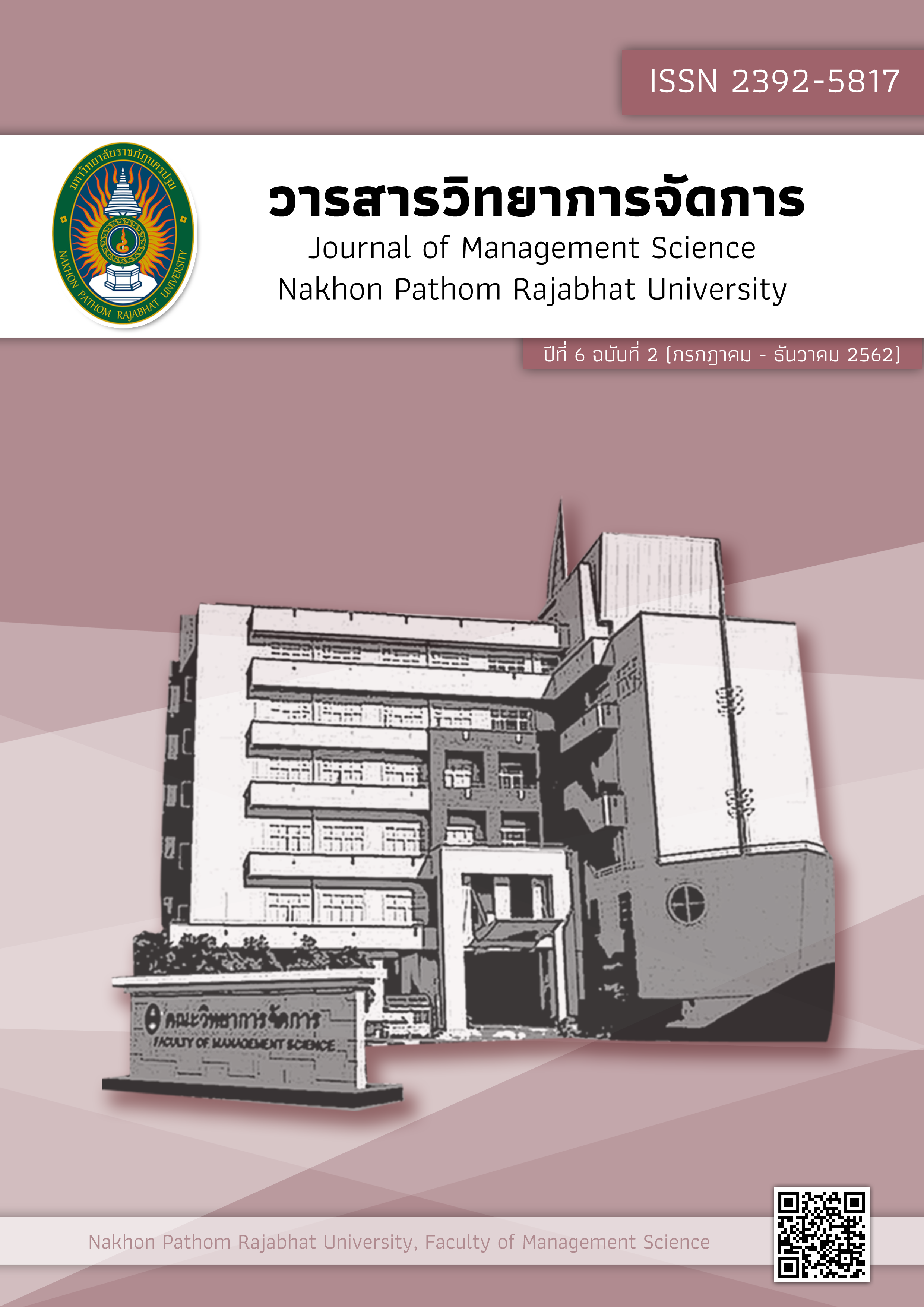ความสัมพันธ์ระหว่างเชาวน์จิตอัจฉริยะกับศักยภาพของผู้ประกอบวิชาชีพบัญชีไทย
Main Article Content
บทคัดย่อ
การวิจัยครั้งนี้มีวัตถุประสงค์เพื่อศึกษาความสัมพันธ์ระหว่างเชาวน์จิตอัจฉริยะที่มีต่อศักยภาพของผู้ประกอบวิชาชีพบัญชีไทย ใช้แบบสอบถามในการเก็บข้อมูลจากผู้ประกอบวิชาชีพบัญชีไทยจำนวน 401 คนที่เข้ารับการอบรมกับสภาวิชาชีพบัญชีโดยการสุ่มกลุ่มตัวอย่างแบบตามสะดวก งานวิจัยนี้ใช้สมการโครงสร้างแบบกำลังสองน้อยที่สุดบางส่วน (PLS-SEM) เพื่อศึกษาความสัมพันธ์ระหว่างเชาวน์จิตอัจฉริยะที่มีต่อศักยภาพของผู้ประกอบวิชาชีพบัญชีไทยผ่านตัวแปรคั่นกลางซึ่งได้แก่ การรับรู้ความสามารถของตนเองและความพึงพอใจในงาน โดยผลการวิจัยพบว่าเชาวน์จิตอัจฉริยะมีความสัมพันธ์กับศักยภาพผู้ประกอบวิชาชีพบัญชีไทย ซึ่งสามารถอธิบายได้จากอิทธิพลของการรับรู้ความสามารถของตนเองและความพึงพอใจในงาน นอกจากนั้นศักยภาพผู้ประกอบวิชาชีพบัญชีไทยยังมีความสัมพันธ์กับประสิทธิภาพการปฏิบัติงานอีกด้วย โดยความสัมพันธ์ทั้งหมดมีค่านัยสำคัญทางสถิติที่ระดับ 0.01
* นักศึกษาปริญญาเอกและอาจารย์ คณะบริหารธุรกิจ มหาวิทยาลัยเทคโนโลยีราชมงคลพระนคร ภายใต้การควบคุมของอาจารย์ ดร.ปริญญา มากลิ่น หาวิทยาลัยเทคโนโลยีราชมงคลพระนคร 10300 และอาจารย์ ผู้ช่วยศาสตราจารย์ ดร.พีรยุทธ เจริญสุขมงคล วิทยาลัยนานาชาติ สถาบันบัณฑิตพัฒนบริหารศาสตร์ 10240
Corresponding author: somsri.oud@gmail.com
Article Details
ทัศนะและข้อคิดเห็นของบทความที่ปรากฏในวารสารฉบับนี้เป็นของผู้เขียนแต่ละท่าน ไม่ถือว่าเป็นทัศนะและความรับผิดชอบของกองบรรณาธิการ
เอกสารอ้างอิง
ณัฐชา วัฒนวิไช และจุฑามน สิทธิผลวนิชกุล. (2555). การพัฒนาศักยภาพวิชาชีพบัญชีไทยเมื่อเปิดเสรีทางเศรษฐกิจ. วารสารนักบริหาร, 32(3), 16-25.
ปัญจพร ศรีชนาพันธ์ วรพรรณ เขียวรุจี และปวีณา ศิริภัณฑ์. (2558). ปัจจัยที่ส่งผลต่อปัญหาในการจัดทำบัญชีกองทุนหมู่บ้าน ในเขตอำเภอเมือง จังหวัดลำปาง. วารสารการวิจัยเพื่อพัฒนาชุมชน (มนุษย์ศาสตร์และสังคมศาสตร์), 8(2), 88-97.
พิมพ์พิศา วรรณวิจิตร และปวีนา กองจันทร. (2560). ปัจจัยที่ส่งผลต่อประสิทธิภาพการจัดทำบัญชีของกลุ่มออมทรัพย์เพื่อการผลิตในจังหวัดมหาสารคาม. Veridian E-Journal, Silpakorn University, 10(1), 1926-1942.
ลลิตา แว่นแก้ว ญาณินท์ ตั้งภิญโญพุฒิคุณ และไตรรงค์ สวัสดิกุล. (2558). ความสัมพันธ์ระหว่างคุณสมบัติทางการบัญชีที่ดีกับคุณภาพการทำงานของผู้ทำบัญชีในจังหวัดขอนแก่น. วารสารมนุษศาสตร์และสังคมศาสตร์ มหาวิทยาลัยมหาสารคาม, 34(2), 155-163.
สภาวิชาชีพบัญชี ในพระบรมราชูปถัมภ์. (2550). มาตรฐานการศึกษาระหว่างประเทศสำหรับนักวิชาชีพบัญชี [ออนไลน์]. ค้นเมื่อ 10 กันยายน 2557 จาก https:// nntworld.prd.go.th/royalnews/home. php?id1185
สันสกฤต วิจิตรเลขการ. (2549). International Education Standards (IES) กับวิชาชีพบัญชีในประเทศไทย. จุลสารสมาคมการบัญชีไทย, 3(1), 25-28.
สมศรี เวิ่นทอง และปริญญา มากลิ่น. (2562). เชาวน์จิตอัจฉริยะ : แนวคิดการสร้างความสมดุลผู้ประกอบวิชาชีพบัญชี. เอกสารประกอบการประชุมวิชาการระดับชาติ ครั้งที่ 11 มหาวิทยาลัยราชภัฎนครปฐม, 11(1), 140-141.
สุรพงษ์ นิ่มเกิด, อดิลล่า พงศ์ยี่หล้า และจรัญญา ปานเจิรญ. (2555). ความสัมพันธ์ระหว่างความสุขกับผลการปฏิบัติงานของพนักงานบริษัทที่จดทะเบียนในตลาดหลักทรัพย์ เอ็ม เอ ไอ. วารสารดุษฏีบัณฑิตทางสังคมศาสตร์(ฉบับมนุษยศาสตร์และสังคมศาสตร์) มหาวิทยาลัยธุรกิจบัณฑิตย์, 2 (2), 6-20.
อภิญญา อิงอาจ และชลธร อริยปิติพันธ์. (2553). การรับรู้ความสามารถของตนด้านการเรียนและความสามารถในการฟันฝ่าอุปสรรคของนักศึกษา. วารสารวิชาการมหาวิทยาลัยกรุงเทพ, 9(1), 30-43.
Bandura, A. (1997). The anatomy of stages of change. American Journal of Health Promotion, 12(1), 8-10.
Cammann, C., Fichman, M., Jenkins, G. D., & Klesh, J. (1983). Michigan Organizational Assessment Questionnaire. In S. E. Seashore, E.E. Lawler, P. H. Mirvis, & C. Cammann (eds.), assessing organizational change: A guide to methods, measures, and practices (71–138). New York: Wiley-Interscience.
Charoensukmongkol, P. (2017). Superstitious Behaviors and Perceived Job Performance of Internal Auditing Staffs in Thailand. Thammasat Review, 20(2), 18-38.
Cook,S., Macaulay,S., & Coldicott,H. (2004). Change Management Excellence (4-16), London: Kogan Page.
Efron, B., Hastie, T., Johnstone, I. and Tibshirani, R. (2004) Least angle regression. Annuals of Statistics, 32(2), 407–451.
Fornell, C., and Larcker, D. F. (1981). Evaluating Structural Equation Models with Unobservable Variables and Measurement Error. Journal of Marketing Research, 18(1), 39-50.
Gieseke, A.R. (2014). The Relationship between Spiritual Intelligence, Mindfulness, and Transpormational Leadersip Among Public Higher Education Leaders. Doctoral Dissertation of Education Northeastern University.
Hair, J. F., Black, W. C., Babin, B. J., & Anderson, R.E. (2009). Multivariate data analysis. Upper Saddle River, NJ: Prentice Hall.
Hassan,J. (2013). Role of Spiritual Intelligence of Rehabilitated and Normal Adolescents in Developing Emotional Intelligence, Adjustment and Locus of Control. Doctoral Dissertation of Philosophy in Psychology Dravidian University.
Henseler, J., Hubona, G. & Ray, P. A. (2016). Using PLS Path Modeling in New Technology Research: updated guidelines. Industrial Management & Data Systems, 116(1), 2-20.
Hosseini,M., Elias,H., Krauss,S.E., & Aishah,S. (2010). A Review Study on Spiritual Intelligence, Adolescence and Spiritual Intelligence, Factors that may contribute to Individual Differences in Spiritual Intelligence and the Related Theories. Journal of Social Sciences, 2(2), 429-438.
King,D.B. (2008). Rethinking Claims of Spiritual Intelligence: A Definition, Model, and Measure. Master of Science Trent University.
Kock, N. (2019). WarpPLS 6.0 User Manual. Laredo, TX: ScriptWarp Systems.
Krishnan, R., Loon, K. W., & Tan, N. Z. (2018). The Effects of Job Satisfaction and Work-Life Balance on Employee Task Performance. International Journal of Academic Research in Business and Social Sciences, 8(3), 652-663.
Marghzar.S.H. & Marzban. A. (2018). The Relationship between Spiritual Intelligence and Efficacy among Iranian EFL Teachers. Theory and Practice in Language Studies, 18(1), 67-73.
Rashvand,O.,& Bahrevar,E. (2013). A Study of the Relationship among Spiritual intelligence, Organizational Citizenship Behavior and Turnover Intentions. Journal of Organizational Behavior and Human Resource Managemnt, 1(2), 25-34.
Rani,A.A, Abidin,I., & Ab Hamid, M.R. (2013). The Impact of Spiritual Intelligence on Work Performance: Case studies in Government Hospitals of East Coast of Malaysia. Journal of Global Macro Trends, 2(3), 46-59.
Safaeian,M. & Esmaeilinasab, M. (2014). Comparison of spiritual intelligence, job stress and coping styles between nurses and doctors. Journal of Environment and Life Sciences 3(2), 233-237.
Schwarzer, R., & Jerusalem, M. (1995). Generalized Self-Efficacy scale. In J. Weinman, S. Wright, & M. Johnston, Measures in health psychology: A user’s portfolio Causal and control beliefs (35-37). Windsor, UK: NFER-NELSON.
Zohar, D., & Marshall, I. (2000). Spiritual Intelligence - The Ultimate Intelligence (3-8), London: Bloomsbury Publishing Plc.


